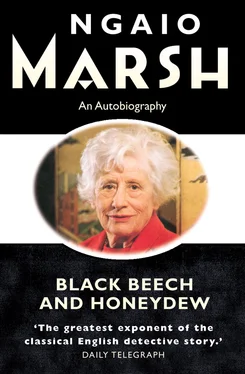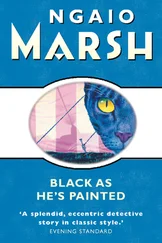Ngaio Marsh - Black Beech and Honeydew
Здесь есть возможность читать онлайн «Ngaio Marsh - Black Beech and Honeydew» — ознакомительный отрывок электронной книги совершенно бесплатно, а после прочтения отрывка купить полную версию. В некоторых случаях можно слушать аудио, скачать через торрент в формате fb2 и присутствует краткое содержание. Жанр: unrecognised, на английском языке. Описание произведения, (предисловие) а так же отзывы посетителей доступны на портале библиотеки ЛибКат.
- Название:Black Beech and Honeydew
- Автор:
- Жанр:
- Год:неизвестен
- ISBN:нет данных
- Рейтинг книги:4 / 5. Голосов: 1
-
Избранное:Добавить в избранное
- Отзывы:
-
Ваша оценка:
- 80
- 1
- 2
- 3
- 4
- 5
Black Beech and Honeydew: краткое содержание, описание и аннотация
Предлагаем к чтению аннотацию, описание, краткое содержание или предисловие (зависит от того, что написал сам автор книги «Black Beech and Honeydew»). Если вы не нашли необходимую информацию о книге — напишите в комментариях, мы постараемся отыскать её.
Black Beech and Honeydew — читать онлайн ознакомительный отрывок
Ниже представлен текст книги, разбитый по страницам. Система сохранения места последней прочитанной страницы, позволяет с удобством читать онлайн бесплатно книгу «Black Beech and Honeydew», без необходимости каждый раз заново искать на чём Вы остановились. Поставьте закладку, и сможете в любой момент перейти на страницу, на которой закончили чтение.
Интервал:
Закладка:
The Ngaio Marsh Collection
Black Beech and Honeydew
Ngaio Marsh
In remembrance of my mother
Table of Contents
Cover Page
Title Page The Ngaio Marsh Collection
Dedication In remembrance of my mother
CHAPTER 1 ‘All Kind Friends and Relations’
CHAPTER 2 The Hills
CHAPTER 3 School
CHAPTER 4 Mountains
CHAPTER 5 The Coast
CHAPTER 6 Winter of Content
CHAPTER 7 Enter the Lampreys
CHAPTER 8 Northwards
CHAPTER 9 Turning Point
CHAPTER 10 New Ways
CHAPTER 11 Exercise Heartbreak and Recovery
CHAPTER 12 Second Wind
CHAPTER 13 A Last Look Back
Bibliography
By the Same Author
Copyright
About the Publisher
CHAPTER 1 ‘All Kind Friends and Relations’
In 1912, on a midsummer morning in the foothills of the Southern Alps, I experienced a moment of absolute happiness: bliss, you might call it, only I don’t want to kill the recollection with high words.
Whenever I travel backwards, as of course one inclines to do as one grows older, it is at this point that I find an accent, a kind of halt, as emphatic as one of those little stations that interrupt the perspective of railway lines across the Canterbury Plains in New Zealand. I am almost afraid to stop there because, as everybody knows, one may return too often to past delights; to the smell of a book, of a crushed geranium leaf, of a box-tree hedge, hot with sunshine: or of honeydew in summertime.
This was a morning that would soon grow very warm. At that early hour – about half-past six – one could already smell the honeydew. It is exuded by a tiny insect and sweats in transparent globules through a black, mossy parasite that covers the trunks of native beech trees in New Zealand. Chip-dry twigs snapped under my feet. Bellbirds, exactly named, absent-mindedly prolonging their dawn-song, tinkled in the darker reaches of the bush. From our hidden tents, the smell of woodsmoke and frying bacon drifted through the trees. Someone climbed down to the river for water and a bucket clanked pleasantly. I came to a halt and there at once was the voice of the river filling the air in everlasting colloquy with its own wet stones.
It was then abruptly that I was flooded by happiness. In an agony of gratitude, I flung my arms round the nearest honeyed tree and hugged it. I was fourteen years old.
An impressionable age, of course, but, if this was a moment of typical adolescent rapture, I can only say that for me it was unique. One anticipates or remembers happiness; one feels but does not define, responds but does not pause to say, of the present delighted moment: ‘How astonishing! I am perfectly happy.’
I have recorded this sensation because I recognized it when it happened. For that reason it might be said to have been a moment of truth. With this trip to an isolated station I move down the parallel lines of my backward journey until they meet at the point where remembrance seems to begin.
In the first decade of this century, Fendalton was a small, genteel suburb on the outskirts of Christchurch in the South Island of New Zealand. Large Edwardian houses stood back in their own grounds masked by English trees. Small houses hid with refinement behind high evergreen fences. Ours was a small house. There was a lawn in front and an orchard behind. To me they were extensive but I don’t suppose they amounted to more than a quarter of an acre. I remember the trees: a pink-flowering, glossy, sticky-leafed shrub that overhung the garden gate, a monkey-puzzle which I disliked and a giant (or again so it seemed to me) wellingtonia that I was able to climb. From its branches I looked south across rooftops and gardens to a plantation of oaks with a river flowing through it where we kept our rowing-boat. Behind that was Hagley Park with a lake, sheep and playing fields, then the spire of Christchurch Cathedral and in the far distance, the Port Hills. I might have been an English child looking across a small provincial city except that when I turned to the north, there, on a clear day, forty miles across the plains, shone a great mountain range.
Outside my bedroom window stood a lilac bush, a snowball tree and a swing. In the orchard I remember only a golden pippin, currant bushes, a throbbing artesian well, hens and a rubbish heap. The rubbish heap is appallingly clear because in it one afternoon, when I was about six years old, I buried a comic song which I had previously stolen from the drawing room and torn to pieces. It was called ‘Villikins and His Dinah’ and the last line was ‘a cup of cold poison lay there by her side’. My father, who had an offhand, amused talent in such matters, used to sing this song in Dickensian cockney with mock heroics and whenever he did so struck terror to my heart. The paper-chase fragments of this composition must have been found, I think, that same evening. I remember my mother’s very beautiful troubled face and her saying rather despairingly, ‘But why? Why did you?’ I must have shown, or tried to express, my fear because I was not in deep disgrace and only had to say I was sorry to my father and promise to tell my mother about things that frightened me. In the end, but it seems to me it must have been a long time afterwards, I did manage to tell her of my terror of poison and how, without believing them, I constantly made up fantasies about it being spread like invisible butter on handtowels or inserted slyly into the porridge one was made to eat for breakfast.
‘But do you think I put it there?’ asked my gentle mother.
‘Not truly,’ I wept. ‘Not really and truly.’
With her arm sheltering me, she said profoundly, to herself, not to me: ‘It must have been The Fool’s Paradise.’
This, I should explain, was a play. Was it by Sutro or perhaps a translation from Sardou? My parents, who were gifted amateurs, had recently played in the piece and had, I imagine, rehearsed their scenes together in my hearing, never supposing that I understood a word of them. The theme was that of a femme fatale who slowly poisoned her husband and was suspected and finally accused of her crime by the family doctor. I have no idea whether it ended in her arrest or suicide but rather think the latter. I am sure my mother was right and that it was this highly coloured drama that engendered the terror which obsessed me, in the validity of which I did not believe and which took so long to evaporate. To this day, on the rare occasions that I use poison in a detective story, I am visited by a ludicrous aftertaste of my childish horrors.
It may be seen from this episode that I supported the theme, so indefatigably explored by psycho-novelists, of the anguish of the only child. I was, I am afraid, a morbid little creature.
For all this, there were raptures, delights and cosy satisfactions.
Here are my parents, standing before the range in an old-fashioned colonial kitchen. My father, an amateur carpenter, has been building a boat. He carries his pipe in his hand and wears a red tam-o’-shanter on his head. His arm is round my mother. They are smiling at me. I am in a sort of fenced baby swing that has been slung from the ceiling. I swoop towards them and my father says delightfully, ‘We don’t want you.’ He gives me a shove and I am swung away from them, shouting with laughter. He has me on his shoulders. The doors have been shut and we are in a dark passage but perfectly secure. He gives a leap and we are in the roof. He is talking to the friendly house-pixies who reply in falsetto voices. Do I know that it’s an act? I think I do, but am enchanted all the same. He tells me, for the hundredth time, his original story of Maria and John who bought a piglet called Grunter which, in trickery, was replaced by a terrier pup. If he changes a word I correct him. He tries
Читать дальшеИнтервал:
Закладка:
Похожие книги на «Black Beech and Honeydew»
Представляем Вашему вниманию похожие книги на «Black Beech and Honeydew» списком для выбора. Мы отобрали схожую по названию и смыслу литературу в надежде предоставить читателям больше вариантов отыскать новые, интересные, ещё непрочитанные произведения.
Обсуждение, отзывы о книге «Black Beech and Honeydew» и просто собственные мнения читателей. Оставьте ваши комментарии, напишите, что Вы думаете о произведении, его смысле или главных героях. Укажите что конкретно понравилось, а что нет, и почему Вы так считаете.










